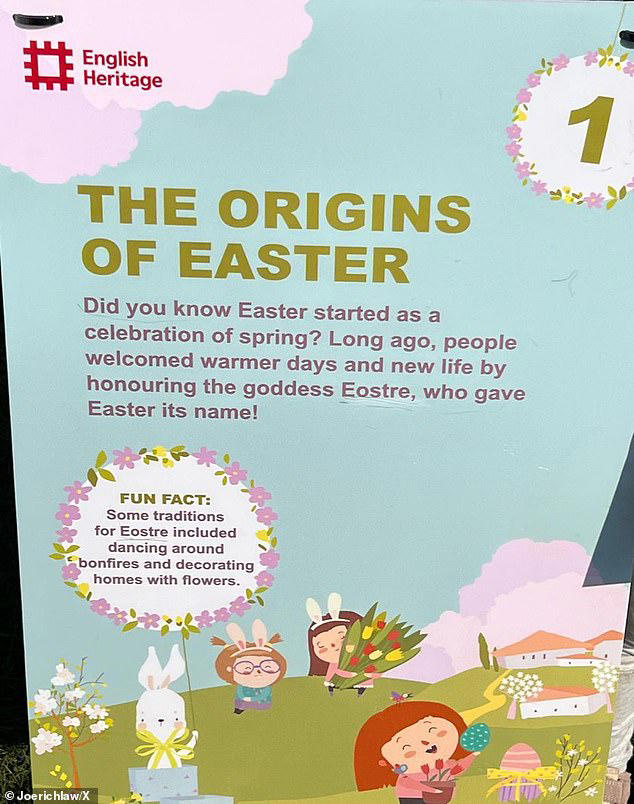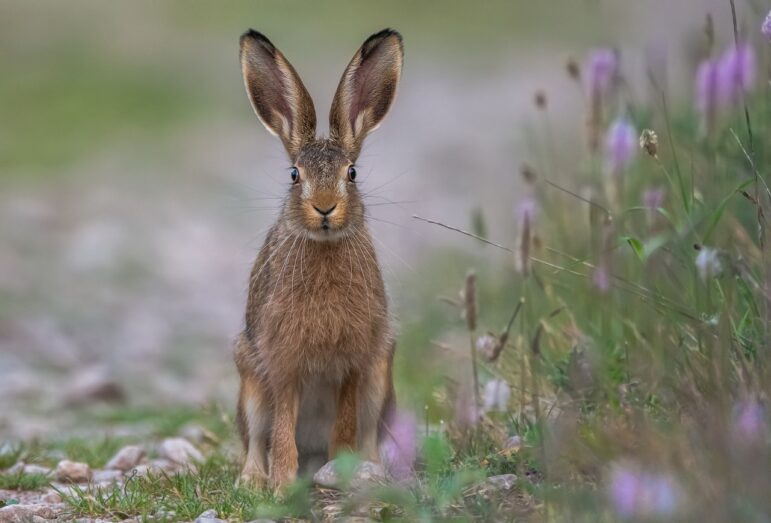LONDON – A new educational initiative by English Heritage, the UK charity charged with preserving historic sites and monuments, has drawn criticism from religious commentators after the charity distributed children’s materials highlighting the pre-Christian, Pagan roots of Easter. As part of its “Easter Adventure Quest,” held at various historic sites, the organization offers posters and booklets referencing Eostre, an Anglo-Saxon goddess of spring and fertility, as the origin of the holiday’s name.

English Heritage Logo
Ēostre (also spelled Eastre) is a proposed Anglo-Saxon goddess associated with spring, dawn, and fertility. Her connection to Easter is primarily linguistic and stems from a single written source: the 8th-century English monk Bede, in his work De Temporum Ratione (The Reckoning of Time), written around 725 CE.
Bede claimed that the month of Eosturmonath (roughly April) was named after a goddess called Eostre, and that:
“In olden times the English people… used to celebrate a festival in her honor during this month. Now they designate the Paschal season by her name.”
This is the only primary historical reference to Eostre. No earlier texts, inscriptions, or archaeological evidence that directly references her.
Because Bede’s Eosturmonath coincides with the Christian celebration of Easter, and because many Easter customs (like eggs and hares) are linked to fertility and springtime, later writers—especially in the 18th and 19th centuries—began to associate Eostre with Easter more explicitly. The name Easter in English and Ostern in German are thought to derive from Eostre/Ostara, while other languages use terms derived from Pascha (e.g., Pâques, Pascua, Pasqua).
Unsurprisingly, raising the prospect of a Pagan goddess and the possibility of a secular spring celebration has attracted backlash from some Christian observers, as reported by The Telegraph, who object to the omission of references to Christ or the resurrection in materials geared toward children.

“Easter Adventure Quest” via X
Those participating in the events involving the “Easter Adventure Quest” at sites such as Whitby Abbey, Dover Castle, and Down House, children encounter a poster reading: “Did you know Easter started as a celebration of spring? Long ago, people welcomed warmer days and new life by honouring the goddess Eostre, who gave Easter its name!” It also notes, “Some traditions for Eostre included dancing around bonfires and decorating homes with flowers.”
The emphasis on Pagan symbolism and seasonal celebration has led critics to accuse English Heritage of “whitewashing” Easter’s religious roots [yes, dear reader, you read that right]. One such critic, Phil—a Catholic primary school governor in Kent—posted a photo of the Easter poster on social media after visiting a site with his son, commenting, “There was no mention of Christ or Christianity… I appreciate the pagan side of the name’s origins, but it’s not the only part—Christianity is central to what Easter is.”
Conservative councilor Joe Rich called the poster “pathetic,” accusing English Heritage of erasing “our Judeo-Christian roots in favour of an obscure eighth-century god.” Social media user Julie McNamee added, “I’m not a Christian but if you’re going to pretend to educate children, you can at least have a passing mention of the Christian Easter story!”

Image Credit: Sven Ziegler [Pixabay
Cardinal Vincent Nichols, Archbishop of Westminster and President of the Catholic Bishops’ Conference of England and Wales, also responded in a rejoinder acknowledging the Pagan origin of the term “Easter,” which is linked to the springtime festival of Eostre and the Old English word springan, meaning “to rise up or burst forth.” Still, he emphasized that for Christians, the holiday centers on the resurrection of Jesus Christ. “While the linguistic roots of Easter are ancient,” he wrote in The Telegraph, “the events it commemorates reach back even further in time. Easter celebrates not just Christ rising from the tomb, but the enduring message of humble service and love he embodied.”
Despite the controversy, English Heritage defended its educational approach. The organization’s website affirms that Easter has been “the most important date in the religious calendar since the very earliest days of Christianity.” A spokesperson explained: “We care for over 400 sites, and across them all—from panels and guidebooks to audio tours and our website—we explore a broad and deep range of historical themes, including religious ones.”
The charity highlighted Whitby Abbey as an example of its inclusive programming. It was at this site in 664 CE that the Synod of Whitby helped align English Christian practice with Roman traditions, including the calculation of Easter. “Our Easter Adventure Quest is a trail for children which references a range of fun facts about seasonal traditions, cultures, and religions, including Christianity,” the spokesperson noted.
Viewed through the lens of educational and religious pluralism, English Heritage’s initiative offers an opportunity—not a threat. Pagan traditions, long neglected or misunderstood, are crucial to understanding the evolution of festivals like Easter. Including them enriches historical education and promotes respect for the diverse beliefs and practices that have shaped Britain’s cultural heritage.
In an increasingly secular and multicultural society, framing public celebrations solely through one religious narrative risks flattening a far richer cultural tapestry. English Heritage’s decision to acknowledge Eostre in its materials invites deeper exploration—not just of where our traditions come from, but how they continue to inspire meaning through religious observance, seasonal cycles, and shared cultural memory.
Life-sized bunnies delivering candy are conspicuously absent from the Passion of Jesus. Yet while some critics argue that omitting Christianity misrepresents Easter’s meaning, others contend the modern holiday has layered origins that deserve holistic exploration.
The Wild Hunt is not responsible for links to external content.
To join a conversation on this post:
Visit our The Wild Hunt subreddit! Point your favorite browser to https://www.reddit.com/r/The_Wild_Hunt_News/, then click “JOIN”. Make sure to click the bell, too, to be notified of new articles posted to our subreddit.